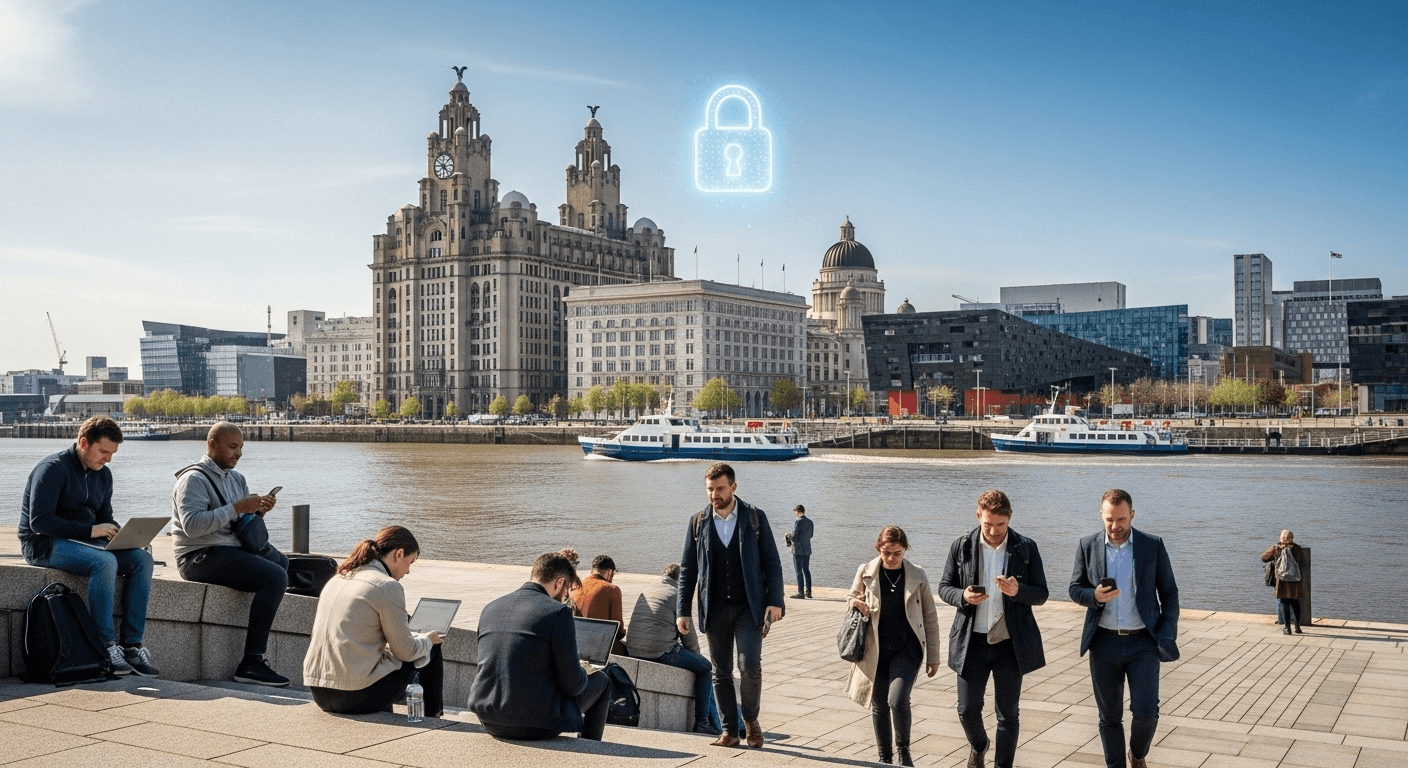Liverpool is a modern, connected city. Whether you’re a resident dashing between appointments, a student studying in a cafe, or a visitor exploring the iconic waterfront, you’re never far from a free public Wi-Fi connection.
But before you automatically click “connect,” it’s important to understand both the fantastic benefits and the real dangers of using these open networks.
The Benefits: The Power of Free Connectivity
Public Wi-Fi in Liverpool offers some significant advantages that make daily life more convenient:
- Saves Your Mobile Data: Streaming music on the Mersey Ferry, using maps to navigate the city, or uploading photos of your adventures can quickly use up your monthly data allowance. Public Wi-Fi lets you do all this without touching your data limit.
- Essential for Tourists: For visitors, it’s a godsend. It allows for easy access to maps, translation services, and information on attractions without incurring costly roaming charges.
- Boosts Productivity: The city’s networks enable people to work, study, or handle personal tasks from almost anywhere, turning coffee shops and public squares into impromptu offices.
- Staying in Touch: It provides a free and easy way to check emails, send messages, and video call friends and family while on the move.
Where to Find It: You can find free Wi-Fi in Liverpool at many public locations, including Liverpool Central Library, various community libraries, and all Merseyrail underground stations. You can also find hotspots at popular venues like the Albert Dock, the St. John’s Shopping Centre, and numerous cafes and restaurants throughout the city. For a comprehensive list, use a Wi-Fi hotspot map app or website, which can show you the closest available connections.
The Dangers: Understanding the Risks
The crucial thing to remember is that public Wi-Fi is “public.” Its open and unsecured nature is the source of its risks, much like having a conversation in a busy town square instead of a private room.
- Man-in-the-Middle Attacks: This is a common threat. A hacker can intercept the data travelling between your device and the Wi-Fi router. This means they could capture your passwords, credit card numbers, and private messages without your knowledge.
- Fake Hotspots (Evil Twins): Cybercriminals can set up a malicious network with a deceptively simple name. If you connect, all your internet traffic can be monitored.
- Data Snooping: Using readily available software, hackers can “eavesdrop” on unencrypted data being sent over the network.
- Increased Vulnerability: Unsecured networks can make your device more susceptible to malware or software that steals your personal information.
Your Digital Safety Guide: How to Protect Yourself
You don’t have to avoid public Wi-Fi altogether. By following a few simple rules, you can enjoy the benefits while staying secure.
- Use a VPN (Virtual Private Network): This is the single most effective step you can take. A VPN encrypts all data to and from your device, creating a secure private tunnel that hackers cannot penetrate. Many reliable and affordable VPN services are available.
- Look for HTTPS: Always check that the website address begins with https:// and has a padlock icon in the browser bar. This means your connection to that site is encrypted. Never enter personal details on a site that only uses http://.
- Verify the Network Name: If you’re in a cafe or library, ask a staff member for the official name of their Wi-Fi. Avoid connecting to generic or misspelled network names.
- Turn Off Auto-Connect: Disable the setting on your devices that automatically searches for and connects to available Wi-Fi networks. This prevents you from accidentally joining a malicious one.
- Limit Sensitive Activities: Avoid online banking, shopping, or accessing any accounts that require a password while on public Wi-Fi. If you must, ensure your VPN is active first.
- Forget the Network: Once you’re done, go into your settings and tell your device to “forget” the network. This stops it from automatically connecting again in the future.
In Summary:
Liverpool’s public Wi-Fi is a fantastic resource. Embrace it for general browsing, navigation, and research. However, always treat it with caution. For any private activity, a VPN is essential.
By being aware of the risks and taking these simple precautions, you can safely enjoy everything this brilliant city has to offer, both online and off.
Stay informed and enjoy your time in Liverpool!




